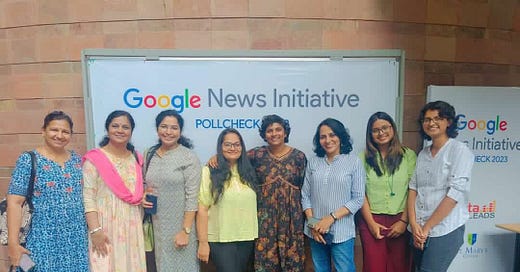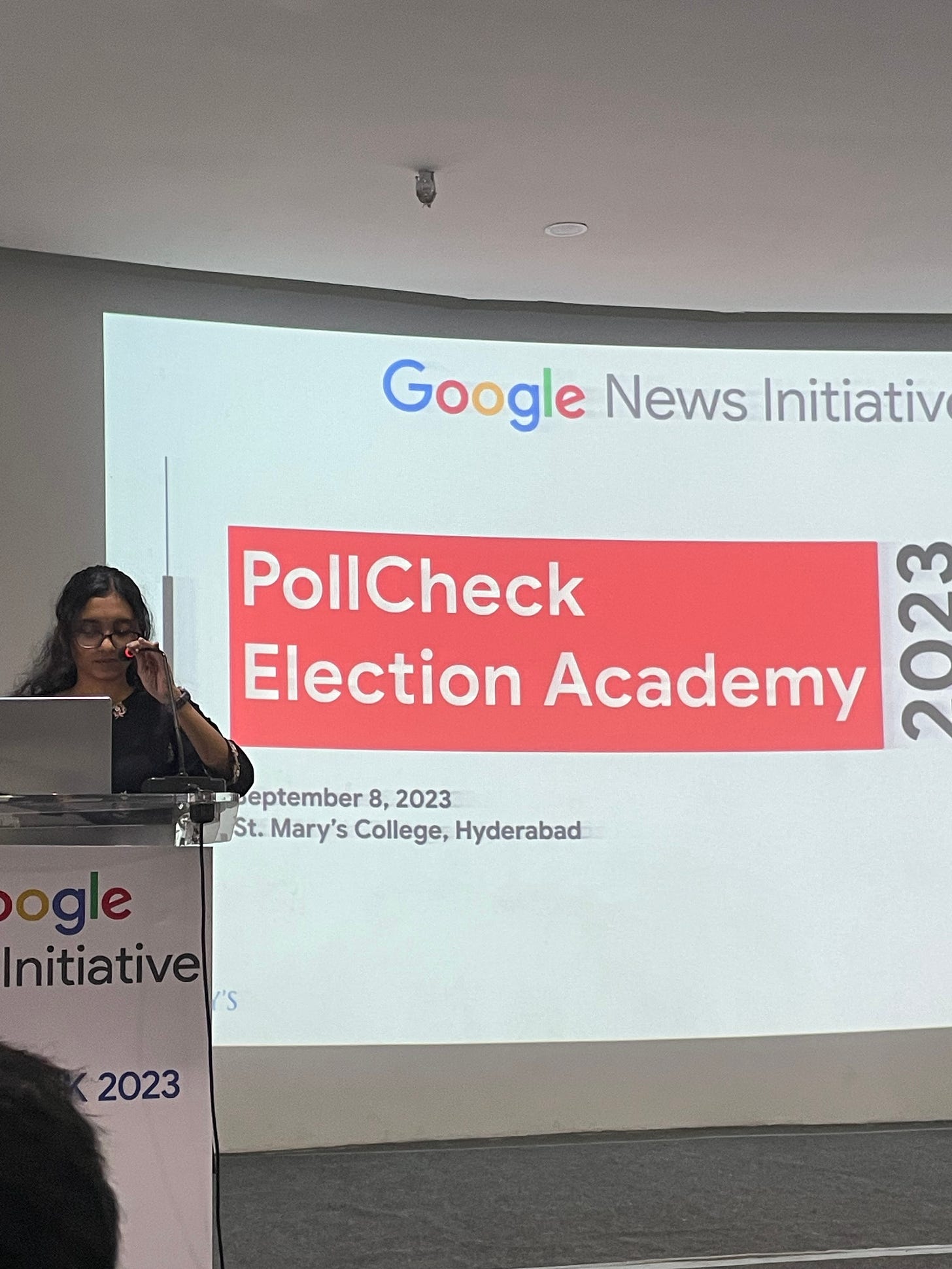Empowering the Keyboard warriors!
Empowering Journalists and Digital Citizens in the Age of (Mis)Information
Dear reader,
How’s it been going?
I recently took part in PollCheck Election Academy 2023, a digital training series for journalists covering upcoming elections in India hosted by the Google News Initiative, in partnership with DataLeads and InOldNews at St. Mary College. This workshop was an eye-opener, focusing on election reporting and the art of fact-checking.
The first session, led by Sudhakar Reddy Udumula, Editor (Investigation) of Times of India & GNI-India Training Network Trainer, delved deep into the world of digital investigation and verification. At the heart of responsible journalism lies the critical practice of fact-checking, and Mr.Sudhakar generously shared tools, techniques, and strategies to help us distinguish fact from fiction. We explored fact-checking in real-time during political speeches, learned to spot biases when consuming information, and honed our skills for top-notch election reporting. This workshop reinforced the importance of ethical journalism and our role in combating the spread of misinformation.
We also took a deep dive into the fascinating world of misinformation, from hoaxes and parody to satire and propaganda, with real-world examples like the notorious Donald Trump election conspiracy. He emphasised the power of narratives in election reporting. We discovered how captivating stories, paired with engaging videos and posts, can shape public perception. Investigating fake images became a meticulous art, using techniques like Google Advanced Search, reverse image searches, and metadata analysis.
While you may not consider yourself a journalist, it's important to recognise that in today's digital age, we all play a role in consuming and influencing content to some extent. These skills and tips we've discussed are crucial for becoming an informed and conscientious digital citizen.
Furthermore, Sudhakar introduced us to a toolkit of verification resources that have become our trusty companions in the world of fact-checking and image verification. From Whichfaceisreal.com and Yonder.com to Bing.com and Invid for video verification, these tools are invaluable.
Our second session, led by Sanshey Biswas & Manon Verchot, Mobile Journalists and Co-Founders of In Old News, took us on an exciting journey into video storytelling for elections. We explored a diverse range of video formats, from explainers and vox pops to series, short form, tutorials, ground reports, features, and round tables. These formats are versatile tools that captivate and engage our audience effectively.
We also learned from seasoned creators, studying their styles and techniques. For election coverage, we discussed specialised techniques like creating short, attention-grabbing videos, using greenscreens to enhance visual appeal, infusing humour and drama for engagement, employing map zoom-ins for data visualisation, crafting concise explainers, and providing tutorials for informative content.
In a captivating session on "How to Report on Election Data" led by Rakesh Dubbudu, the visionary Founder of Factly & Dataful, we embarked on an enlightening journey into the world of data journalism. This exploration encompassed a wide array of essential data sources, each playing a pivotal role in shaping the narratives of elections. From census data to economic statistics, surveys, regulatory information, transaction records, indices, and invaluable electoral data, we delved deep into the tools that empower journalists to uncover the stories behind the numbers.
Mr. Rakesh also left us with a series of thought-provoking questions that continue to resonate:
Do women tend to support female candidates? This question probes the intricate dynamics of gender in politics.
Can a government's hold on power be attributed primarily to votes from a particular caste group? Here, we can uncover the influence of identity politics.
How does one navigate the labyrinth of opinion and exit poll data, deciphering these critical indicators to make informed judgments?
What do emerging trends in NOTA (None of the Above) voting reveal, and are there discernible patterns in this electoral phenomenon?
These queries emerge from the world of statistics, yet numbers alone seldom unveil the complete narrative. It is the journalists or our "keyboard warriors," armed with data, who, with the same fingers we use to vote, bridge the gap between mere figures and captivating narratives, ultimately revealing the true essence of elections.
The next session was held by Ravi Raj, where he shared insights as the Content Partnerships Manager at YouTube, the discussion revolved around the role of YouTube in the realm of news. While YouTube offers a fantastic platform for individuals to express their ideas, this session sparked a conversation among journalists. Many raised questions about YouTube's monetisation policies and whether it's a viable platform for sustaining journalism, given its stringent regulations pertaining to copyright, advertisements, and handling sensitive subjects.
The workshop was undeniably fantastic, and while it provided me with numerous valuable takeaways, the most profound lesson wasn't explicitly taught during the sessions. It was a lesson learned by simply being immersed in a room filled with professionals, including seasoned experts, all of whom devoted an entire day to enhancing their skills and knowledge. This experience underscored the critical importance of staying updated in both technology and the industry. It served as a powerful reminder that continuous learning and personal growth should remain at the forefront, regardless of one's level of experience. Moreover, I had the privilege of connecting with some of these professionals, who graciously shared their time and priceless insights. In sum, it was an incredibly enriching and enlightening experience.
Lastly. As Shahrukh Khan's character Azad emphasised in his latest hit movie "Jawan," use your finger to pose questions through your vote.




Asymmetrical information causes inefficient choices and more importantly digital platforms’ control over information is detrimental to democracy.